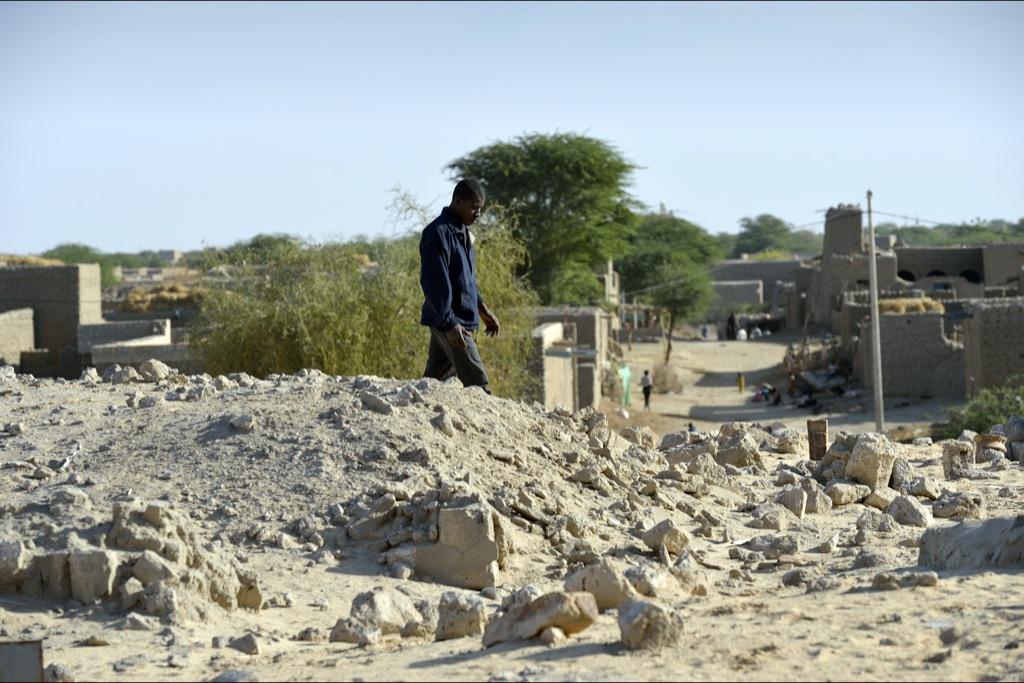The Face of Fanaticism emerges again in Timbuktu
A man walks on Jan. 29, 2013 in the ruins of the Sidi Moctar shrine, which was destroyed by Islamists in July, in a cemetery of Timbuktu.
It was good fortune that most of the precious documents of Timbuktu were spirited away before Islamic extremists took over northern Mali. Not long after they gained control of that ancient seat of learning in the Sahara Desert, they set about destroying the documents left behind as well as Sufi shrines.
Their actions seemed so similar to the way the Afghan Taliban behaved, culminating in the destruction of the giant Buddhas of Bamian — one of the most important cultural sites in the entire world. Both acts were crimes against history itself. The Islamic extremist practice of cutting off of hands, the public executions in sports stadiums, the forcible removal of women from the work place, was replicated in Mali until the French intervention.
Winston Churchill, as long ago as 1921, warned of this fanaticism that now roils the East and threatens the West. “In the vast deserts of Arabia,” he told parliament, there was a desert chief, Ibn Saud, many of whose followers belonged to the Wahhabi sect.“ This is a form of Mohammedism that bears, roughly speaking, the same relation to orthodox Islam as the most militant form of Calvinism would have borne to Rome in the fiercest times of religious wars.
The Wahhabi profess a life of exceeding austerity, and what they practice themselves they rigorously enforce on others. They hold it as an article of duty, as well as faith, to kill all who do not share their opinions and to make slaves of their wives and children. Women have been put to death in Wahhabi villages for simply appearing in the streets …”
“Austere, intolerant, well-armed and bloodthirsty,” Churchill said. “In their own regions the Wahhabis are a distinct factor which must be taken into account, and they have been, and still are, very dangerous to the holy cities of Mecca and Medina, and to the whole institution of the pilgrimage in which our Indian fellow-subjects are so deeply concerned.”
He went on to say that Ibn Saud has “shown himself capable of leading, and within considerable limits, of controlling these formidable sectaries.” But the time when the Saudi royal family could control the extremism of the Wahhabis has long passed.
Churchill could not have foreseen that Ibn Saud, within the next decade, would take over Mecca and Medina, and that the whole region would become a country bearing his name, Saudi Arabia, or that oil would be discovered in the eastern provinces, and that the desert prince would reign over riches beyond the dreams of avarice.
The Saudi monarchy struck a bargain with the Wahhabis. We will rule, they said, and you can be in charge of religion. An unspoken part of the deal was that the Wahhabis could make mischief abroad as long as they didn’t threaten the Saudi state.
The great transfer of oil money from the West into the oil producing countries in the 1970s meant that Wahhabis could spread its doctrine into Pakistan, the former “Indian subjects” that Churchill had worried about, and into Afghanistan.
With the advent of al Qaeda, the Wahhabis implanted its doctrine into every corner of the Muslim world. The destruction of Sufism, a softer, more tolerant form of Islam, seems to be a Taliban goal in Pakistan.
In the Wahhabi mind, life should return to what it had been in the 7th century when the Prophet Mohammed was still alive; all that followed was apostasy.
In this they are similar to the Khmer Rouge of Cambodia. The Khmer Rouge talked of going back to the year zero, a twisted version of the French Revolution, the way the Islamic extremists represent a distorted version of the teaching of Mohammed.
The Khmer Rouge, too, raged against Western and modern influence, and even emptied cities to create a pre-modern agrarian society that not even the Taliban attempted. The Khmer Rouge represented a political fanaticism, while we now are faced with a religious fanaticism; both were essentially rural and anti-urban movements indulging in mass killing.
The Khmer Rouge was a brush fire in the dying forests of Communism, a failed doctrine that is now, in Leon Trotsky’s words, “in the dust bin of history.” Muslim fanaticism, however, is like a fire in a coal seam, and will take a very long time indeed before it burns itself out.
This is not the first time precious documents have been destroyed in Timbuktu, however. The French, when they captured the city in 1893, burned manuscripts they considered antithetical to French ideals. Intolerance comes in many colors.
